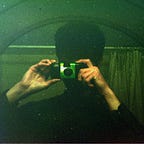How Radiohead’s “Kid A” Predicted The Future
Kid A was born out of frustration.
The release of OK Computer in 1997 changed everything for Radiohead. It was fascinating, thought-provoking, critiquing, and — more than anything — emotional. Eerie, allusive commentaries on modern technology’s ability to brainwash, monotony in the working world, and a sense of impending doom from who-knows-what, along with masterful melodies and unforgettable drops, spread throughout the project with a chilling intensity. From the moment the album was released, they were critically-acclaimed as the “saviors of rock”, a group that could finally provide the blunt introspection the world needed to hear. The album sold millions instantly, the tour was a massive success, and they were consistently in the mix for awards at any nameable show.
For Radiohead, it was exhausting.
While OK Computer was uniquely honest, it was easily consumable. Structurally, musically, and thematically, the album hardly ventures outside the realm of discomfort. Radiohead undoubtedly created something beautiful, but did so while appealing to marketability — withholding something intrinsic to their potential as artists. There’s nothing wrong with that, of course; Radiohead was just tired of the people-pleasing.
The expectations among fans and critics for Radiohead to release another album that clings to conventional art-rock were polar opposites from what the band wanted to move toward. Thom Yorke became infatuated with electronic music, finding the usage of unorthodox rhythms and melodies just as moving as a guitar — and twice as thought-provoking. Yorke, finding his lyricism in past works uncomfortable to listen to, preferred the idea of using the voice as an instrument rather than a front. Verses were written with randomness and inconsistency in mind, painting indirect, unsettling imagery that provides incomplete pictures in the heads of listeners rather than telling stories. Aphex Twin, Miles Davis, and Talking Heads, among others, became the group’s inspirations in the early stages of Kid A’s recording process. Radiohead — giving a bras d’honneur to expectations, critics, and labels — embraced a wild adventure in the midst of their commercial peak.
And the finished product happened to be the greatest, most unsettling predictor of modern times.
Take the opening track, “Everything In Its Right Place”. The synth’s chord progression, as well as Thom Yorke’s glitchy, manipulated vocals, mix together perfectly to create something creepy. The verses are similarly off-putting: “There are two colors in my head / There are two colors in my head / What was that you tried to say?”, he says. Immediately, there’s a tension in the air. What does he mean? What’s wrong? Is everything really in its right place?
If you weren’t unsettled yet, the next track would probably do the trick. Yorke’s voice is hardly distinguishable on the title track, the vocoder and heavy layering and editing of his singing forcing him to sound closer to Microsoft Sam than a human being. Yorke wrote the lyrics of the song by scribbling on slips of paper and taking them out of a hat, making his content matter vague, yet consistently dismal. You can hardly make out what he is saying over the music-boxlike production and layered vocal effects: “We’ve got heads on sticks / You’ve got ventriloquists”. “The National Anthem” is emphatically more direct, sending you into an orchestral hellscape of horns that resemble a musical anxiety attack.
Despite the excess of ambiance and musical disorder, the album embodies detachment and loneliness. Yorke attempts to convince himself that “I’m not here” and “this isn’t happening” in “How to Disappear Completely”, trying to force himself away from whatever dystopia he finds himself stuck in. “Idioteque” peaks with pure chaos, as the fast-paced drums set the rhythm for what seems like an apocalypse bound to happen. It was a radical shift from the vague sense of discomfort that Radiohead was known for creating; “We’re not scaremongering, this is really happening / mobiles skwerking, mobiles chirping / Take the money and run”, Thom exclaims in the second verse. To this point, the album was letting you know something was up — but now, you’re in trouble.
Underneath it all, there’s an odd sense of truthfulness that comes with the record. It’s undeniably authentic, given that Radiohead stripped back everything that made them a “rock band”, making melodies out of synthesizers and manipulated voices rather than guitars for most of the album. That authenticity provides introspection into the culture we live in that even OK Computer couldn’t match. Where OK Computer rendered us uncomfortable with ideas of uniformity and monotony, Kid A transformed that discomfort to fear. Despite the vagueness of the lyrical content stemming from Yorke’s writing style, Yorke manages to directly reference concerns that humanity faces today — climate change, for example, in “Idioteque”, or consumerism and exploitation in “Optimistic”. The uncertainty in Yorke’s lyrical matter, along with vocal melodies that teem with tenseness and unease, resemble broken communication, misunderstanding, and isolation.
What Radiohead did especially well with Kid A was combine the brutal honesty of OK Computer’s themes with production that matches the chaotic nature of the fast-paced world we live in today. Face it — the amount of time we spend in front of screens is killing the emotional connection that makes us human. There’s a direct correlation between how much time we spend on social media and how lonely we feel. Our social skills and ability to interact with others have weakened with constant smartphone use. You can only wonder what’s to come next from the increasingly-demanding world of technology. Kid A — with its inherent bleakness and grim outlook on humanity — told us so.
